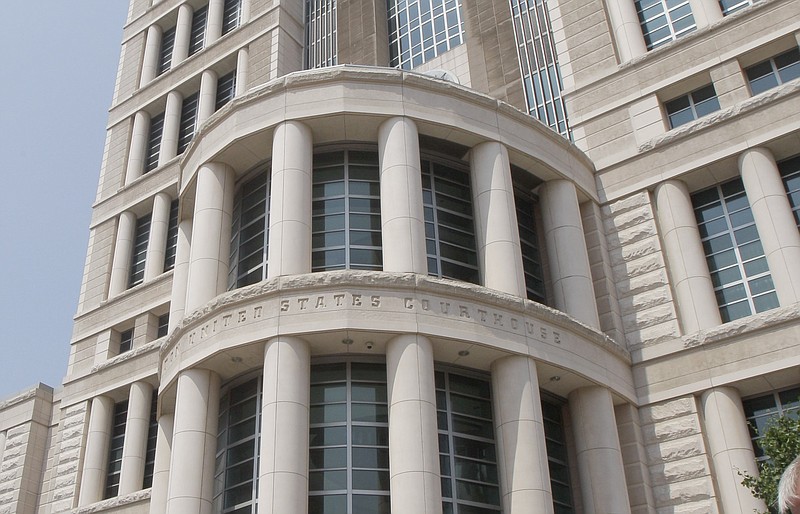Arkansas Attorney General Tim Griffin has petitioned the 8th Circuit U.S. Court of Appeals in St. Louis to review a district court decision that struck down Arkansas' law banning transgender health care for minors, and has asked the full 8th Circuit to review the decision and to apply a different standard of review to the ruling.
On June 20, U.S. District Judge James M. Moody Jr. overturned Act 626 of 2021 that was the subject of a two-week trial split into two parts last year, ruling in a permanent injunction that the ban violates the Equal Protection Clause, the Due Process Clauses, and the First Amendment of the U.S. Constitution. Two years ago in July, in a rare ruling from the bench, Moody granted a temporary injunction to block the law from going into effect until the case was resolved, a ruling that was upheld by the 8th Circuit.
The first-in-the-nation law, had it gone into effect, would have prohibited doctors from providing or referring transgender young people for health care related to the medically recognized condition known as "gender dysphoria." Gender dysphoria is defined by the Mayo Clinic in Rochester, Minn., as the feeling of discomfort or distress that might occur in people whose gender identity differs from their sex assigned at birth or sex-related physical characteristics.
The legislation would have prohibited the use of hormones and puberty-blocking drugs for young people and gender-affirming surgical procedures, as well as insurance coverage for gender-affirmation treatment for the young, and removed any requirement that insurance carriers provide any coverage for gender-affirmation procedures in general. It was passed in 2021 by GOP super-majorities in both the House and Senate over a veto by then-Gov. Asa Hutchinson.
"I am asking the full Eighth Circuit to hear our appeal now rather than assigning this case to a three-judge panel," Griffin said in a news release issued Thursday. "Two other federal courts of appeal have allowed similar laws protecting children from experimental gender-transition procedures in Tennessee, Kentucky and Alabama to go into effect. Those decisions demonstrate that last year's three-judge panel decision upholding an order blocking Arkansas's law was erroneous, and that's why I am asking the entire court to overrule that decision."
In July, the 6th Circuit Court of Appeals lifted a temporary block on a Tennessee law similar to Arkansas' Act 626 of 2021. In August, a three-judge panel with the 11th Circuit lifted an injunction on an Alabama law that banned gender-affirming care for adolescents. In Kentucky, a federal judge in July lifted an injunction blocking a similar law in that state, using the earlier ruling in Tennessee as a partial basis for that decision.
In Thursday's filing, Griffin said the 8th Circuit's panel that reviewed the temporary injunction had applied the wrong standard of review to the law in holding "that intermediate scrutiny applied to laws regulating pediatric gender-transition procedures," saying the panel should have instead "applied rational-basis review and upheld Arkansas's law," and he asked for an "en banc" review by the full 8th Circuit.
In deciding cases under the U.S. Constitution's Equal Protection Clause, the U.S. Supreme Court has developed a three-tiered approach to analysis of such questions; strict scrutiny, intermediate scrutiny and rational basis. Under strict scrutiny, the most stringent standard, the government must show that the challenged classification serves a compelling state interest and that the classification is necessary to serve that interest. Intermediate scrutiny requires that the government show that the challenged classification serves an important state interest and that the classification is at least substantially related to serving that interest. Rational basis, the lowest standard of scrutiny, requires that the government need only show that the challenged classification is rationally related to serving a legitimate state interest.
Thursday's filing said that, "many children 'later come to regret' those procedures and 'identify with their' biological sex rather than their perceived gender identity," and that, "regret 'can happen with individuals who medically transitioned as adolescents or as adults' and 'is common in medicine.'"
A 2021 review of 27 studies involving almost 8,000 teens and adults who had transgender surgeries, mostly in Europe, the U.S and Canada, 1% on average expressed regret. For some, regret was temporary, but a small number went on to have detransitioning or reversal surgeries, the review said.
Holly Dickson, executive director of the American Civil Liberties Union of Arkansas, which provided legal assistance during the Arkansas trial, said regardless of the standard of review, Moody's ruling should stand.
"We should win this case under any standard," Dickson said.
